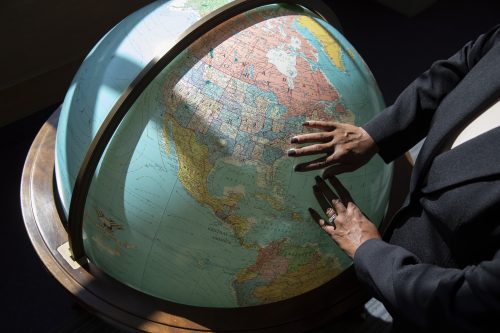Cultural Deep Dive
Sonja Watson invites readers to a richer understanding of Latin America’s history and diversity with a new book.

Sonja Watson, dean of the AddRan College of Liberal Arts and professor of Spanish & Hispanic studies, believes many in the world overlook Latin Americans' complex histories. Photo by Joyce Marshall
Cultural Deep Dive
Sonja Watson invites readers to a richer understanding of Latin America’s history and diversity with a new book.
In Latin America and the Hispanic Caribbean, trans-Atlantic shifts ushered in cultural changes. When groups of people, such as those enslaved in West Africa, were forcibly relocated across the ocean, they brought their past with them. But according to Sonja Watson, dean of the AddRan College of Liberal Arts and professor of Spanish & Hispanic studies, the rest of the world overlooks Latin Americans’ complex histories.
“I think one of the largest misconceptions, certainly not the only one, centers around the lack of awareness of Black populations in these countries,” Watson said. “My research on Afro-Latin America, and by extension Afro-Panama, aims to shed light on the racial diversity of Latin America/Caribbean and to spread awareness about the Black experience.”
Watson co-edited Transatlantic, Transcultural and Transnational Dialogues on Identity, Culture and Migration with Lori Celaya, associate professor of Spanish and co-director of Latin American studies at the University of Idaho.
The book is a collection of essays that touches on a range of experiences that contribute to the complexity of what it means to be Latin American. The essays tackle themes of diaspora, or the dispersion of populations; migration; and globalization.

“We’re connected globally through music. And we saw that manifest itself on the national stage when the reggaetón artist Bad Bunny took home the MTV Video Music Award for Artist of the Year,” Sonja Watson said. Photo by Joyce Marshall
In addition to serving as co-editor, Watson wrote a chapter about the artistic expression connected to the African diasporas in Latin America. After the conquest of African nations by the Spanish and Portuguese, more than 4 million enslaved Africans were brought to Latin America, including roughly 3.5 million to Brazil.
African heritage in Latin America is still visible in the arts. Watson writes about reggaetón, a music genre rooted in reggae and hip-hop.
“We’re connected globally through music,” Watson said. “And we saw that manifest itself on the national stage when the reggaetón artist Bad Bunny took home the MTV Video Music Award for Artist of the Year” in 2022. Hip-hop’s global reach and authentic storytelling encouraged Watson to use it in her classroom; the music also serves as a text for her research.
“I read hip-hop the same way I read a novel or a short story written by someone of African descent in Latin America,” she said. “And I use it as a text to inform about the Black experience in Latin America. And this shows us a different experience, kind of a culture from below.”
Watson’s use of the term “culture from below” describes the subculture or counterculture of excluded members of society who are economically disenfranchised or deprived of their voice.
“I read hip-hop the same way I read a novel or a short story written by someone of African descent in Latin America. And I use it as a text to inform about the Black experience in Latin America.”
Sonja Watson
The hip-hop artists whom Watson analyzes in her chapter illustrate a shared experience of oppression and discrimination based on racial and sexual identities as well as their work to insert the Black Latin American experience into the national polity.
Take, for instance, U.S. rapper Wiz Khalifa’s 2014 hit single “We Dem Boyz.” It’s an anthem chronicling the artist’s economic success and his hardships along the way: “First-round draft pick, hittas stay in the field/On that poor side of town, grinding to pay our bills.”
“It is a bravado piece illustrating economic progress and triumph despite all odds,” Watson writes. “Filmed in a working-class Black neighborhood, the music video brings the audience into Wiz Khalifa’s world, privileging its space and place.”
In a show of lyrical diasporic solidarity, hip-hop group Los Rakas remade Wiz Khalifa’s hit into “We Dem Rakaz.” Instead of celebrating Wiz Khalifa’s Atlanta, they highlight the connection between Panama and Oakland Bay, California.
“Using hip-hop to teach Black culture in the Spanish-speaking Americas provides a way to analyze issues that affect Black descendants globally and to engage U.S. audiences — and especially those of African descent — in Spanish language, culture and literature classrooms,” she said.
The book has garnered noteworthy praise from academics.
“An innovative, wide-ranging collection of chapters that address ‘trans’ topics in spirited and challenging ways,” writes Gustavo Pérez Firmat, the David Feinson professor emeritus of humanities at Columbia University.
Sheridan Wigginton, a professor of Spanish and Latin American studies at California Lutheran University, said she appreciates how each chapter stands on its own as a focused dive into how African diasporic communities navigate various forms of crossing to create an identity in new geographic, political and linguistic spaces.

Hip-hop’s storytelling and global reach prompted Sonja Watson to use it in her classroom and her research. Photo by Joyce Marshall
“Most significant, however, is the work’s collective message that a thoughtful consideration of ‘culture from below’ invites a rich, interdisciplinary discussion about the interconnectedness of migration and identity in Latin America and the Hispanic Caribbean,” Wigginton writes.
Watson said she wants the book’s theme of interconnectedness not to be limited to Latin Americans, but to speak to every reader regardless of background. “There is more that unites us than what divides us,” Watson said. “You should see that these are people with the same love for family, desire for culture and expression.”

Your comments are welcome
Comments
Related reading:
Research + Discovery
On Board for Recovery
TCU’s Mobile Health Unit helps substance users get on the road to health and hope.
Research + Discovery
Comprehensive, Collaborative Care
At TCU, addressing student mental health is a campuswide priority.
Research + Discovery
Unwanted Inheritance
Mikaela Stewart’s research is geared toward disarming a deadly breast cancer gene.